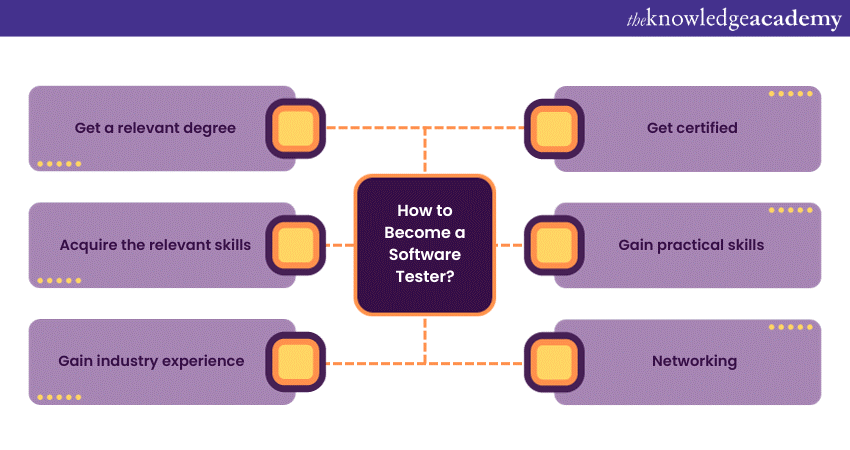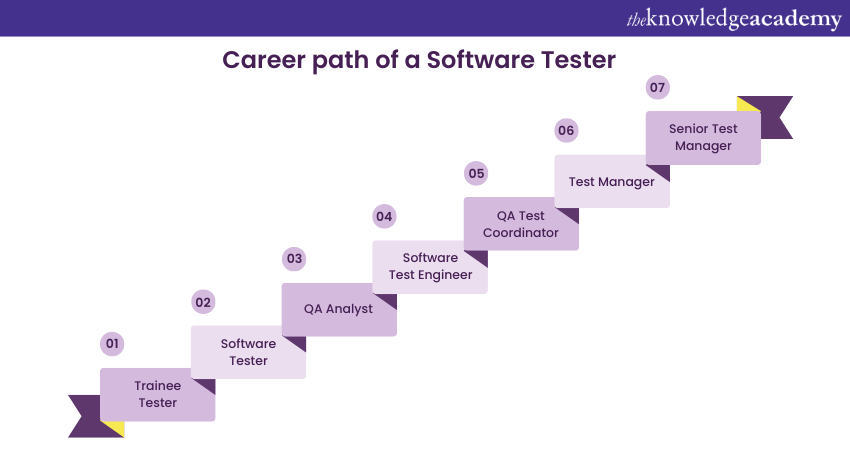We may not have the course you’re looking for. If you enquire or give us a call on +358 942454206 and speak to our training experts, we may still be able to help with your training requirements.
We ensure quality, budget-alignment, and timely delivery by our expert instructors.

We live in an era where mobile applications and software applications become an important part of our lives. But while using it, do you ever wonder who makes sure to provide its best interface, user experience, functionality and other aspects? They are Software Testers who act behind this procedure. Software Testers play an important role in ensuring the quality and functionality of applications and systems.
If you want to make your career in Software Testing, read this blog to learn about How to Become a Software Tester. Our comprehensive guide provides insights and tips on how to become a skilled Software Testing professional. Discover the steps and strategies.
Table of contents
1) What is a Software Tester?
2) What does a Software Tester do?
3) How to Become a Software Tester?
4) Technical skills needed to become a Software Tester
5) Non-technical skills needed to become a Software Tester
6) The career path of a Software Tester
7) Salary of Software Tester
8) Conclusion
What is a Software Tester?
A Software Tester, also known as a Quality Assurance (QA) Tester, is a professional who is responsible for analysing and testing software applications to make sure that they achieve quality and performance standards before releasing them to the end-users. The main objective of the Software Tester is to identify and report defects or issues in the software to assist developers in making required changes.

What does a Software Tester do?
Now, move on to some basic roles and responsibilities of a Software Tester. Let's understand.
1) Test planning: Software Testers create a test plan that outlines objectives and Testing approach for a certain project. This plan specifies what aspects of software will be tested and what type of test cases will be used.
2) Test case design: Software Testers are responsible for designing the test cases that define the step which needs to be followed and the expected results for various scenarios in that software.
3) Test execution: Testers use the test cases, interact with the software and record the outcomes.
4) Defect identification: When the Software Testers find some kind of issue or defects in the software, they document these issues and provide detailed information to the developers.
5) Regression testing: Software Testers are responsible for performing regression testing to make sure that new changes or fixes have not met new issues or caused previously fixed defects to resurface.
6) Automated testing: There are some Software Testers who get specialisation in creating and maintaining automated test scripts, which can help speed up the testing process specifically for repetitive and frequent tests.
7) Performance testing: Software Testers assess the software's performance, scalability, and reliability under different conditions, such as load testing, stress testing, and scalability testing.
Get certified with our ISTQB Software Testing Foundation Course today!
How to Become a Software Tester?

A Software Tester is considered a highly lucrative and sought-after career option in the tech industry. To become a finest Sofware Tester, there are some requirements that an individual needs to meet, including the right education and skills. Here are the following steps to become a successful Software tester.
1) Get a relevant degree: An individual who wants to become a Software Tester should start their journey by ensuring that they have a master's or bachelor's degree in a relevant field such as computer information systems, computer science, business management, electrical engineering or Information Technology. However, it's not mandatory to have such kind of degree, but it will help you in becoming a professional Software tester career.
2) Acquire the relevant skills: An ideal candidate for Software tester should have some basic knowledge of programming languages and code with their complete concepts along with architecture algorithms and object-oriented programming. Acquiring some technical skills in Linux and SQL will add value to the Software tester career.
3) Gain industry experience: Gaining industry experience as a Software Tester is crucial because it allows you to apply your theoretical knowledge in practical scenarios. In a professional environment, you gain hands-on experience testing real software applications and systems, exposing you to diverse testing environments, such as web applications, mobile apps, or desktop software.
4) Get certified: Getting certified as a Software Tester can enhance your credentials and increase your employability. There are so many software testing courses available to enhance the software skills that will assist you in landing your dream job.
5) Gain practical skills: An individual should acquire hands-on skills in testing tools and technologies. They should learn how to use testing frameworks, test management tools and bug-tracking systems.
6) Networking: Building a strong network is very important in any professional field. So, you should attend software testing conferences, join online forums, and connect with professionals in the field to stay updated with industry trends and expand your network.
Ready to elevate your Software Testing career? Register for our Certified Software Testing Professional (CSTP) today!
Technical skills needed to become Software Tester
Let’s have a look at some technical skills that are required to become a professional Software Tester.
1) Programming skills: A Software Tester must be familiar with at least one or two programming languages in order to write test scripts. The most common programming languages which are used for software testing are Python, Java, Ruby, and C#. These languages are broadly supported by a variety of testing tools globally.
2) Front-end skills: A Software Tester is required to work with web-based applications and browsers. Hence, it is important for any Software Tester professional to get familiar with the front-end languages like CSS, HTML and JavaScript.
3) Database skills: A Software Tester should be familiar with the basics of various types of databases. A tester is required to verify, insert, delete and update the test from the SQL database to test the backend applications. Hence, a professional is required to learn database tables, key indices and SQL commands. It is essential for the Tester to know about connecting databases with different SQL connection clients.
4) API skills: API servers act as middlemen between the database and the UI. A Software Tester is required to test an API that works as a communication layer for data exchange. So, A Software Tester needs to use the software in order to send API calls, which requires an in-depth knowledge of SOAP and REST APIs.
5) Version control system: It is vital to keep the version control system maintained for tracking, monitoring and collaborating with other team members. It assists in reviewing the changes and also to various processes with detailed reports. Hence, A Software Tester should be familiar with complete accessing and working processes with version control systems like SVN, Git and many more.
6) UNIX/Bash commands: A software developer must have the basic knowledge of UNIX or Bash commands to drive between files. UNIX commands allow a Tester to push and pull code easily from the GitHub repository.
The best way to get hired is to prepare well—start practicing with Software developer interview questions and show them why you’re the perfect fit!
Non-technical skills needed to become Software Tester
Now, let’s know about some non-technical skills that are required to become a professional Software Tester.
1) Analytical skills: A Software Tester is required to have analytical skills in order to break down a complicated piece of software into small chunks for writing effective scripts on it.
2) Communication skills: Effective communication is essential for the Software Testers. They need to report defects and issues clearly and concisely to the developers, managers and other team members. Hence, they should know how to communicate effectively.
3) Time management skills: Software Testers must know how to manage their time effectively to meet project deadlines and prioritise testing activities.
4) Critical thinking: Software Testers should be able to think critically and explore edge cases and scenarios that might not be covered in the software requirements.
5) Collaboration and teamwork: Testers work closely with developers, project managers, and other team members. Collaborative skills are essential to facilitate effective communication and teamwork.
6) Adaptability: Software environments are constantly changing, and testers need to adapt to new tools, technologies and methodologies.
Advance your Automation Testing skills with JUnit 5 by registering in Automation Testing With JUnit 5 Course
Career path of a Software Tester

Like other fields, you can kickstart your Software Tester career as a Software Tester trainee, and gradually, you will be promoted to a senior role with years of experience and time. Below is the table which will show you the career path paved for Software Testers.
|
Role |
Years of Experience |
|
Trainee Tester |
Fresher |
|
Software Tester |
1-3 years of experience |
|
QA Analyst |
3-5 years of experience |
|
Software Test Engineer |
3-5 years of experience |
|
QA Test Coordinator |
5-6 years of experience |
|
Test Manager |
8-11 years of experience |
|
Senior Test Manager |
14+ years of experience |
Salary of Software Tester
With the ever-evolving technology and artificial intelligence, the demand for Software Testers is getting higher in the market, and this career option holds a bright future. Currently, the salary of a Software Tester ranges from around 2 lakhs to 7.8 lakhs. It differs according to various factors such as job location, years of experience, type of organisation, skills and more. The average salary of a Software Tester starts from 3.5 lakhs per annum.
Master the art of seamless software quality with our Software Testing Automation Course – Sign up now!
Conclusion
Software Testing is a dynamic and rewarding field with a growing demand in the tech industry. Throughout this blog, you have explored all about the Software Tester and the fundamental steps of How to Become a Software Tester. You have also explored essential technical and non-technical skills to become a proficient Software Tester. The world of Software Testing is rich with opportunities, and your role as a Software Tester for a product is invaluable.
Learn the basics of manual testing methodologies by joining our Manual Testing Training now!
Frequently Asked Questions
What are the Other Resources and Offers Provided by The Knowledge Academy?

The Knowledge Academy takes global learning to new heights, offering over 3,000 online courses across 490+ locations in 190+ countries. This expansive reach ensures accessibility and convenience for learners worldwide.
Alongside our diverse Online Course Catalogue, encompassing 19 major categories, we go the extra mile by providing a plethora of free educational Online Resources like News updates, Blogs, videos, webinars, and interview questions. Tailoring learning experiences further, professionals can maximise value with customisable Course Bundles of TKA.
Upcoming Business Analysis Resources Batches & Dates
Date
 ISTQB Certified Tester Advanced Level Test Management Course
ISTQB Certified Tester Advanced Level Test Management Course
Mon 2nd Jun 2025
Mon 1st Sep 2025
Mon 24th Nov 2025






 Top Rated Course
Top Rated Course


 If you wish to make any changes to your course, please
If you wish to make any changes to your course, please


